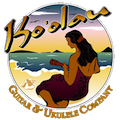 Ko'olau makes some of the finest ukuleles in the world. I'm a little partial as I have two CS Tenor models ( Rosewood back and sides / Cedar top ) I use for everything. As well as several solid-body tenors and we carry their Pono line of ukes at our Funky Frets Music Store.
Ko'olau makes some of the finest ukuleles in the world. I'm a little partial as I have two CS Tenor models ( Rosewood back and sides / Cedar top ) I use for everything. As well as several solid-body tenors and we carry their Pono line of ukes at our Funky Frets Music Store.- Mahogany top, back, and sides (All Mahogany) - This is a traditional combination used for many years by many famous makers such C.F. Martin Company for guitars and ukuleles. warm and mellow tone. Very even note equalization. The most traditional combination of woods for an ‘ukulele have been either all Koa or all Mahogany.
- Mahogany back and sides with Spruce or Cedar top - with the addition of Spruce or Cedar to the top of a guitar or ukulele the overall tonal range is increased. In other words, because Spruce or Cedar are technically “soft” woods, with more tensile flexibility, they can vibrate more freely and thus create clearer and pronounced treble and bass notes. Again, not better, just different.
- Mango is a wood we are using more often. It’s usually plentiful (as long as it’s not mango season, when cutting down a mango tree is very popular). Mango wood grain is sometime unpredictable, and so we only select some, and reject most. The appearance is wildly beautiful. And on our fancy models we try to use the most figured and curly grain. As for tone, Mango is similar to Mahogany in weight, density, and tone.
- Acacia Koa top, back, and sides (available on Ko’olau models only): somewhat similar to Mahogany, but due to it’s density and weight (41lb/ft and .55sg, compared to Mahogany at 34lb/ft and .54sg), Koa produces a brighter, more projecting tone.
- Acacia Preta similar to Acacia Koa, similar density, lighter weight. Warm tone.
- Acacia (Koa or Preta) with a cedar or spruce top. As mentioned above, cedar and spruce are soft woods and flex and vibrate more freely than hardwoods. Thus more projection and a wider tonal range.
- Ebony: the ebony we use is a rare species of ebony. The most common ebony used throughout the centuries has been from Africa, usually called Madagascar Ebony. And traditionally has been all black (though much of it is stained black because the accepted perception of ebony wood is black).
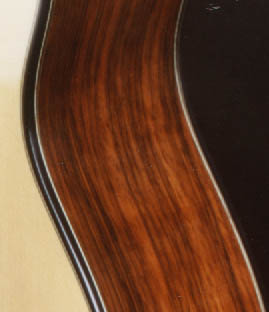
Rosewood
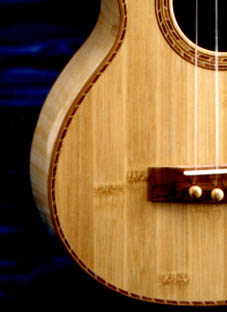
Bamboo
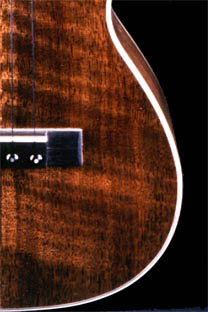
Walnut
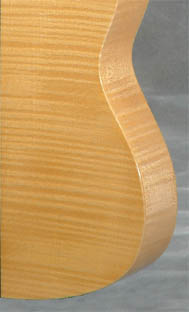
Maple
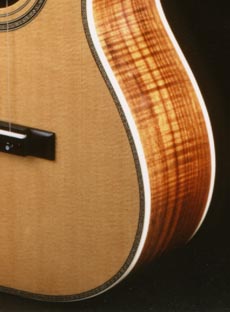
Spruce
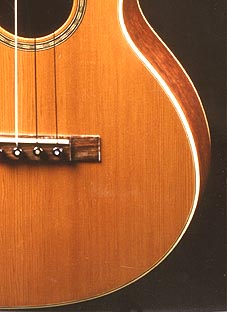
Cedar
- Mya-Moe Ukulele — Gordon & Char Mayer and Aaron Keim - a lutherie team that builds professional-grade custom ukuleles in a variety of models.
- Dana Bourgeois — link
- Regarding Top Woods by James Goodall — link
- Hawaii Forest Industry Association (HFIA) — link
- Ko'olau Guitar & Ukulele Company — link
- Growing Koa: A Hawaiian Legacy Tree — link



Allied Lutherie! - In their 35th year supplying the industry with guitar woods, parts and supplies for the guitar maker. From our base here in Healdsburg, California, we have traveled around the world procuring instrument quality woods, resawing, drying, sanding, sorting and grading them. And we’ve shipped these woods around the world, often back to the country they came from! We offer a wide selection of tonewoods, many of which can be individually viewed and selected by our customers via our Weekly Special.


We offer figured and exotic tonewoods for your acoustic guitar, electric guitar and bass guitars, violins, and mandolins. You can enjoy a variety of these in our Instrument Kits, guitar kits, archtop guitar kits, violin kits, mandolin kits, and more. Tonewoods include figured/curly maple, quilted maple, spalted maple, black walnut, engelmann spruce, sitka spruce, red or adirondack spruce, western red cedar, as well as exotics, such as Bubinga, East Indian Rosewood, Ebony, Cocobolo, Figured Mahogany, Narra, Padauk, Sapele, Wenge, and Ziricote for luthiers and craftsmen.



Located in Barhamsville Virginia, Colonial Tonewoods is a specialty company dealing in high-grade traditional and alternative tonewoods. In a world where big business is the norm, we deviate from this standard by getting to know our customers one at a time. We continually strive to procure the rarest, finest quality tonewoods at competitive prices.



Acoustic guitar, archtop guitar, electric guitar, and ukulele wood sets Ukulele wood sets of Hawaiian Koa. Curly Koa Guitar Wood is one of the largest suppliers of curly Koa guitar wood for guitar building anywhere in the world. Located in Hawaii, we are able to obtain only the finest pieces of this rare exotic wood for guitar making. We have the largest luthier supply of quartersawn Hawaiian Koa for guitar soundboards, backs, and sides.



Exotic Lumber Inc. has its origins in South Africa. Started by Bill van der Westhuizen in Durban in 1988, Country Woods Corporation (www.countrywoods.co.za) has grown into 3 branch locations totalling 65 000 sq ft of warehousing, over 1.15 million board feet inventory, dry kilns, millwork facilities and employing 60 people. When the van der Westhuizen family moved to Annapolis Maryland in 1994, Exotic Lumber was started and expanded in 2002 with the joining of partner Neil Gager. Exotic Lumber operates as a specialty lumber yard and has expanded into two operations servicing the Washington DC / Baltimore areas. We also ship lumber to customers throughout the United States, and with over 130 species in stock have one of the widest selections of lumber available on the East Coast.



Georgia Hardwoods has been a leading distributor of quality plywood, lumber and hardware products since 1988. We have partnered with some of the industries’ most well-known vendors to give you the quality and service that is demanded. In 1997, Georgia Hardwoods entered into manufacturing by producing high quality raised panel doors, drawer fronts and MDF thermofoil wrapped doors.



Gilmer Wood Company started business in 1978 and since that time we have supplied thousands of woodworkers and manufacturers with the world’s finest woods. We are a small company with six employees and just three of us doing all the milling and wood selection. Between the three, we have over 75 years of experience which allows us to search and find wood that will meet the most stringent standards. We can select wood for a certain color, grain, size, and/or figure. We are firm believers in well-seasoned wood and to that end we can offer material that has been aging in our warehouses for up to 30 years. Our principle aim is customer satisfaction and we all take pride in fulfilling this goal.


Guitar Woods, Australias first and most experienced supplier of musical instrument timbers and luthier supplies. Would you like to log yourself in? Or would you prefer to create an account? Since 1982 we have been sourcing top quality tone woods, parts, and tools from around the world for professional luthiers and hobbyists alike. Over the years Guitar Woods and Gilet Guitars have built a reputation for top quality products, friendly service and expert advice.



Over many years LMI has developed the resources and knowledge that enable us to locate woods, prepare them, and provide them to luthiers. Fully 60% of our warehouse space is dedicated to wood storage and handling. Our selection is the largest available anywhere for the custom guitar builder, and the success of our company rides on the quality of the dozens of species of tonewood and hardwood we offer.


Madinter was created in 2001. Since then, it has become a leading company in the sector by distributing its products to all 5 continents, having the most reputable guitar brands among its customers. Our mission is to supply the music manufacturing industry and any person or entity that builds musical instruments. Our offices are in Cerceda, Madrid, from where we deliver our products to more than 40 countries.


Musical Forests Inc. (Northern Tonewood Company) is a producer and seller of naturally aged tonewoods for musical instrument making. We cater to the handmade musical instrument building sector with our high grade guitar tops, violin tops, backs & sides, necks, drop tops, and other parts for acoustic and solid body instruments. Our specialty is in the preparation of woods for top materials, for any of your musical instrument making needs. We also offer Luthier Books, Plans and Accessories which are listed at the bottom of each product page.



We have been been supplying musical instrument tonewood to luthiers and factories since 1999. We specialize in top, back and side sets for guitar, ukulele, mandolin, electric, bass, Weissenborn and other stringed instruments. Ukulele wood sets of Hawaiian Koa, Oregon Claro Walnut (Walnut or Sitka Top) and Alaska Sitka Spruce in Soprano, Concert, Tenor and Baritone sizes.



Rutland Plywood Corporation (RPC) was founded in 1957 as a hardwood plywood supplier to the rope and reel industries. The company remains in its original location in Rutland, Vermont, central to a strong supply on Northern Hardwoods and skilled workforce. Building on this foundation, and owing to consistent innovation, Rutland Plywood has become the world’s premium manufacturer of specialty hardwood composites for a highly diversified and global customer base.


**D&D Tonewood International **is based in Zagreb/Croatia. In the wood business for more than ten years, the company very soon specialized in maple from Bosnia (acer pseudoplatanus) All our wood comes from Bosnia. Bosnian maple is considered to be the finest wood quality for instruments and is in high demand all over the world. It has been widely used by Old Italian Masters and is still being employed with this long standing tradition by violin makers of today.



Winkler Woods LLC was formed in 2002 by the fourth generation Koa wood industry leader, Jorma Winkler, to supply Exotic Hawaiian Woods to customers worldwide, both in lumber and veneer form. The Winklers have been a major distributor of Hawai’ian Hardwoods in Hawai’i for the past few decades. We specialize in supplying your unique Koa, Mango, and Ohia Hawaiian Hardwood needs.

At the Wood Well we are dedicated to helping you achieve your goals.
Fifty years of combined experience has taught us the importance of a reliable wood source. We’re using this knowledge to help you. Whether you’re a first time builder or the most seasoned luthier, we have the materials to meet your needs.

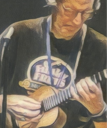
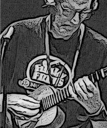

























.jpg)